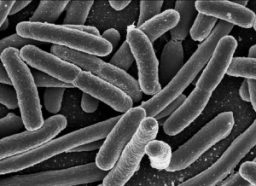Gut Instinct
New mouse study reveals a connection between intestinal bacteria and behavior

Bacteria, a type of germ, are tiny organisms, each made of a single cell. They’re far too small to see with the naked eye — but don’t let their tiny size make you think they’re not important. You should get to know bacteria. For every cell in your brain, bones, organs and blood, there are 10 bacteria. They’re not going anywhere, so you might as well get used to them.
Bacteria can be helpful: Some live in the intestines and aid with digestion. They can also be harmful: Some bacteria cause serious disease. And, believe it or not, some bacteria can be both helpful and harmful. For example, the kinds of E. coli bacteria that live in your intestines are helpful. But the kinds of E. coli consumed through contaminated food are a major cause of food poisoning.
In a recent and surprising study, scientists suggest that bacteria living in the intestines can affect brain development and behavior. That connection may seem strange, since the brain and bowels are far apart. On the other hand, maybe the finding begins to explain why we talk about having a “gut instinct.”
In the study, scientists from Sweden and Germany studied “germfree” mice that had been raised in a sterile environment and kept away from bacteria their whole lives. During various tests of mouse behavior, the germfree mice were more adventurous than regular mice. The germfree mice were bolder and more likely to take risks, like exploring new tunnels in mazes.
Those tests suggest that bacteria can influence mouse behavior. To further explore the question of how bacteria acts on the brain, the scientists tried restoring bacteria to the germfree mice — and found another interesting twist.
After they received bacteria, newborn, germfree mice took fewer risks and acted like the mice that had always been around bacteria. But when the scientists exposed adult, germfree mice to bacteria, those mice didn’t change their behaviors. They remained bold and adventurous.
The researchers don’t know how bacteria affect the brain. But the experiments show that bacteria somehow affect behavior, and the influence happens very early in the mouse’s life.
The researchers hope they can build on the study to eventually learn something about human behavior. But scientists know that the connection between bacteria and behavior in mice isn’t a direct one. People with fewer germs don’t necessarily put themselves in danger. And an unfortunate run-in with E. coli food poisoning isn’t going to make a person less likely to take risks — except, perhaps, in their choice of food.
Sven Pettersson worked on the study connecting bacteria and brain development in mice. He is a microbiologist at the Karolinska Institute in Stockholm and the Genome Institute of Singapore. Microbiologists study life on the tiniest scales — like the single-cell existence of bacteria. Pettersson says that the study hints at interesting relationships that may exist between bacteria and other parts of the body.
“It doesn’t take Einstein to realize that if you can do that for the brain, then [these kinds of] relationships could affect other organs in the body,” Pettersson told Science News. “It’s tickling to think about.”
POWER WORDS
bacteria A large group of single-cell organisms that can live almost anywhere, including inside the human body.
behavior The way an organism acts in response to a particular situation.
microbiology The branch of science that deals with microorganisms, or tiny living things.
microorganism A microscopic organism, like a bacterium, virus or fungus.
cell The smallest unit of an organism, typically microscopic. Microscopic organisms usually consist of a single cell.







